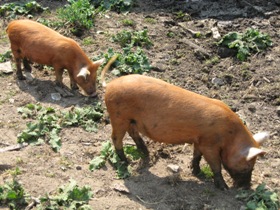West Timor pig industry expanding: Special report

The pig industry in West Timor has expanded rapidly in the eastern islands of Indonesia in the past five years and is now around 1.5 million animals.
Driving this expansion is the increase in local disposable incomes following the population growth and economic development in and around the capital Kupang.
Pig products have always figured largely in the diet of local people, especially smoked barbeque pork known as Se’i, introduced to the region by the Dutch during the colonial period.
Owner of a pork restaurant specialising in Se’i is Osias Saban, whose father learned the smoky barbeque technique when he was a cook for the then Dutch governor.© Saban’s business has prospered in the past five years, enabling him to send his three children to university. He said that local people both rear and eat pork, and that a party without a pig is not a party!
Dr Johanis, a local lecturer in animal nutrition estimates that about 85% of people in West Timor keep pigs; the young pigs are destined for restaurants and the older, dark boars with tusks for cultural events.© With the steadily increasing number of pork restaurants however, local communities are concerned about the growing shortage of pigs for these events.
In addition to traditional pig keeping where the animals roam almost unchecked in a village, some producers have adopted more intensive production methods. One of the largest now has 100 sows, and Dr Johanis said these pigs although kept in small pens appeared healthy and well fed, and the farmer has the potential to breed up to 1,000 piglets a year to sell to smallholders for rupias 600,000-700,000 (nearly A$ 100) each.
Dr Johanis considers that expansion of intensive animal husbandry appears to parallel economic development, but there is no question the people benefit from increased protein in their diet. He co-operates with the Australian Institute for International Agricultural Research (ACIAR), on projects helping to identify market potential and control of pig diseases.
To alleviate the pig shortage cross-bred pigs are imported from Bali, but disease control is vital, for the recent outbreak of classical swine fever killed thousands of pigs in the islands, according to Dr Maria Geong who added that at least 80% of the region’s pigs are infected with classical swine fever, and an infected sow can infect all her piglets. Since giving a piglet to a relation is commonplace, the disease quickly spreads.©
Dr Geong received her PhD from Murdoch University, Western Australia, on an Australian scholarship, and is now head of Animal Health and Public Veterinary Services in West Timor. Dr Geong has support from ACIAR to study the epidemiology of the disease, and has vaccinated pigs on Alor Island, where there have been no further cases, so proving the disease can be controlled and even eradicated from West Timor. Dr Geong is hoping Alor can remain free of the disease, and is also trying to protect the island from the dangerous porcine reproductive and respiratory syndrome.











